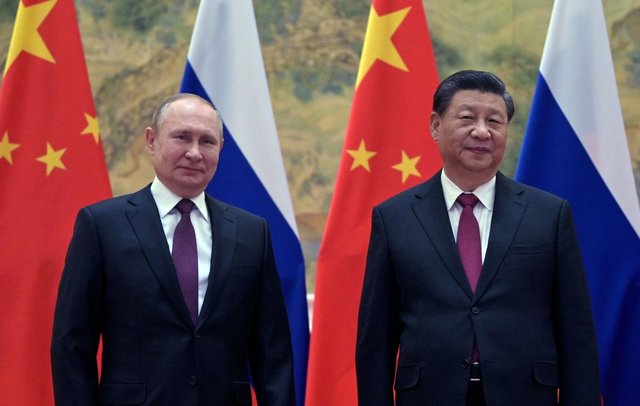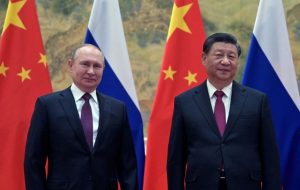DefenceGeneral NewsNews
Which countries are allies with Russia? Why are Belarus and Putin allies – India, China and Brazil relations

With such widespread condemnation, it’s easy to forget that Putin does have some powerful allies around the world…But powerful countries which refuse to condemn Russia are clear: China, Brazil, India and United Arab Emirates
“In a news conference on Sunday (27 February), Brazil’s far-right President Jair Bolsonaro continued to refuse to condemn Russia’s invasion, claiming his country would remain “neutral” in the conflict…Adding that Brazil and Russia are “practically brother nations”, Bolsonaro said: “A big part of Ukraine’s population speaks Russian.”…He also mocked Ukrainian President Volodymyr Zelensky – saying his people had placed their hopes in the hands of a comedian…On 26 Februrary, India was also one of three countries to abstain on a proposed motion “deploring” Russian aggression in Ukraine and calling for an end to the invasion.”
Whether Vladimir Putin’s aggressive invasion of Ukraine leads to a wider conflict remains to be seen, but there’s no doubt the repercussions of the conflict will be felt around the world.
Other countries with disputed or ‘breakaway’ territories will be watching how events unfold very closely, and could be inspired by Russian bravado in the years to come.
Already, the situation has a fairly clear-cut between two sides.
On the one hand, there’s Ukraine, backed by Nato and its members who have pledged support to the effort to defend Ukraine.
Then, there is Putin. But who could come to his aid should he require it. Does he have any allies?
Here is everything you need to know.
Who are Putin’s allies?
The widespread, international condemnation of Russia’s attacks would suggest that Putin has no close international partners, but this is not the case.
While Russia is perhaps not looked upon favourably by the wider world, it does have its friends – the countries of the Eurasian Economic Union (EAEU) are perhaps the first that come to mind.
The EAEU is a political and economic union first proposed by Putin in 2011, and signed into being by initial member states Belarus and Kazakhstan alongside Russia.
Armenia (a permanent political, military and economic ally of Russia) and Kyrgyzstan were welcomed into the union in 2015; all five current members were once part of the USSR.
Putin has previously stated that his goal was to enlarge the Customs Union to all post-Soviet states, uniting economies, legal systems, customs services, and military capabilities to form a bridge between Europe and Asia.

Which other countries are involved?
Putin’s goal in this is presumably to level the playing field of power with the EU and the US, and Tajikistan (again, a former USSR country) has been touted as a potential future member.
It’s not just member countries that have involvement with the EAEU – a number of ‘observer’ countries also lend their support.
These are Moldova, Cuba and Uzbekistan, the latter of which is expected to obtain full membership by 2022 or 2023.
Western analysts generally see the EAEU as a way to reunite many of the former Soviet republics.
The United States has expressed its opposition to the Eurasian Union in the past, claiming it is an attempt to re-establish a USSR-type union among the former Soviet republics.
In 2012, Hillary Clinton – then US Secretary of State – said: “It’s not going to be called that [Soviet Union]. It’s going to be called customs union, it will be called the Eurasian Union and all of that, but let’s make no mistake about it.
“We know what the goal is and we are trying to figure out effective ways to slow down or prevent it.”
Is China an ally?

Whether China can be considered a fully fledged ally to Russia is up for debate, and the two country’s relationship is often described as a “strategic partnership”.
In 2001, they signed the “Treaty of Good-Neighbourliness and Friendly Cooperation”, a 20-year pact which was recently renewed for five more years; it is currently set to run until at least 2026.
The treaty outlines the basis for peaceful relations and economic cooperation, as well as diplomatic and geopolitical reliance.
Controversially, one of the document’s articles can be interpreted as an implicit defence pact, with others hinting at increased military cooperation, including the sharing of “military know-how” and Chinese access to Russian military technology.
The document also affirms Russia’s stand on Taiwan as “an inalienable part of China”, which is arguably the most worrying element.
It is thought that China could take Russia’s lead in the future and invade Taiwan, for similar reasons to Putin’s want of Ukraine.
A commitment to ensure the “national unity and territorial integrity” in the two countries means that a Sino-Russian alliance would be quite a formidable force.
What about Belarus?
Belarus is a long-time ally of Russia, one which analysts often describe as Russia’s “client state”.
With regards to the current conflict, leader Alexander Lukashenko has said Belarusian troops are not currently taking part in the Russian invasion – but could do if needed.
Russia has had troops in Belarus for weeks for military exercises, and its convoys have entered Ukraine from Belarus.
“I say again: our troops are not there. But if it is necessary, if it is necessary for Belarus and Russia, they will,” Lukashenko said in remarks reported by the state news agency, Belta.
Who else supports Putin?
In a news conference on Sunday (27 February), Brazil’s far-right President Jair Bolsonaro continued to refuse to condemn Russia’s invasion, claiming his country would remain “neutral” in the conflict.
Adding that Brazil and Russia are “practically brother nations”, Bolsonaro said: “We will not take sides, we will continue being neutral, and help with whatever is possible. A big part of Ukraine’s population speaks Russian.”
He also mocked Ukrainian President Volodymyr Zelensky – saying his people had placed their hopes in the hands of a comedian.
On 26 Februrary, India was also one of three countries to abstain on a proposed motion “deploring” Russian aggression in Ukraine and calling for an end to the invasion.
T S Tirumurti, India’s permanent representative at the UN, said India abstained in rejection of the language used in the resolution; the United Arab Emirates also abstained.
A news report by written by Alex Nelson, first published in nationalworld.com on Monday, 28 February 2022, with few rearrangement by The DEFENDER.









